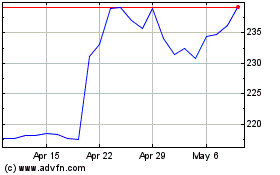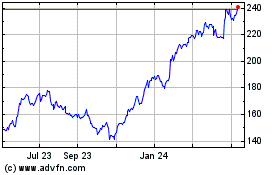By AnnaMaria Andriotis
For more than 20 years, Laura Chapman routinely charged
thousands of dollars a month on her American Express Co. Platinum
card.
The 57-year-old travel agent's income and spending took a dive
after coronavirus made the kind of business trips and vacations she
booked all but impossible. She canceled the card when AmEx charged
her the $550 annual fee.
"I thought 'that's it I'm done,'" said Ms. Chapman, who is still
paying off her balance on the card. "The card won't be worth
it."
Ultra-premium rewards credit cards aren't as rewarding these
days. Banks have spent years fine-tuning the cards to appeal to
big-spending jet-setters, offering generous sign-up bonuses and
extra points on airfare, hotel stays and restaurant meals. Travel
bans and social distancing have made those perks less appealing,
leading some customers to question if the cards are worth their
hefty annual fees.
Banks are scrambling to keep those hard-won customers. JPMorgan
Chase & Co. delayed a planned $100 increase on Sapphire
Reserve's $450 annual fee. It is also doling out extra points on
grocery purchases through the end of June. Citigroup Inc. rolled
out extra points on online grocery, drugstore and other purchases
made with its premium Prestige card through August. AmEx is
offering consumers who have the Platinum card up to $320 in
statement credits when they use their card to buy certain streaming
and wireless-phone services.
A pandemic that has grounded flights and closed borders is the
biggest test to date for this slice of the credit-card business,
which has helped banks deepen their relationships with wealthier
consumers. And, as millions of Americans are skipping their debt
payments and banks are setting aside billions of dollars to cover
potential losses on soured loans, it is a revenue source they can
ill afford to lose.
Doling out extra points for groceries and other everyday
expenses could become costly for banks.
"These aren't minor changes," said John Grund, a managing
director of payments at Accenture PLC. "Most issuers are trying to
stay top of wallet until they get line of sight as to whether they
have to do something more dramatic."
The coronavirus shutdown drastically altered consumer spending.
Credit-card spending was down 21% in the U.S. in May from the same
time a year ago, according to Visa Inc. Travel spending on credit
and debit cards fell more than 70% in May, Visa said, while food
and drugstore spending increased more than 20%.
"The Amazons, Netflix, Walmarts, Targets are up, groceries are
up. And then obviously restaurants, travel, airports are down 95%
or something like that," James Dimon, JPMorgan's chief executive,
said at a conference in late May.
So far, card issuers say they aren't seeing an increase in
cancellations, though some customers have switched to other cards
with low or no annual fees and less generous rewards. The new
reward offerings, they said, are meant to better align the cards'
benefits with their customers' new spending habits.
"Given the fact that things like our...lounge collection are not
particularly useful right now for most of our card members, we've
added different benefits that are more appropriate to today's
environment on a temporary basis," Jeffrey Campbell, AmEx's finance
chief, said at a June conference.
Claire Lee downgraded her Chase Sapphire Reserve card to the
bank's Freedom card in April to avoid the annual fee. The
24-year-old technology product manager said she charged about $100
on the card in April, a 10th of her pre-pandemic spending.
In the year she had it, Ms. Lee said she booked around a dozen
trips on the Sapphire Reserve. She used it a few times a week at
restaurants and to pay for parking near her office. Now, she is
working from home in Los Altos, Calif., and cooking most of her
meals.
"I buy groceries more than I ever bought in my life," said Ms.
Lee. She said she plans to go back to the Sapphire Reserve when it
is safe to travel again.
Travel rewards cards have bounced back from other shocks,
including the Sept. 11 terrorist attacks and the 2008 financial
crisis. This time is different. Coronavirus is still spreading
rapidly in many parts of the world and, absent a vaccine, it is
hard to predict when travel will return to pre-pandemic levels.
Banks are developing cards with lower annual fees that emphasize
food delivery, streaming services and home renovation, according to
people familiar with the matter. They are weighing adding rewards
benefits for national parks, campgrounds and museums in an effort
to branch out beyond airlines and hotel chains, the people
said.
Meanwhile, card issuers are paying up to keep their best
customers.
Zakeel Gordon said he called AmEx in March to downgrade his
Platinum card to a Green card. He said AmEx offered him a statement
credit of $500 to cover most of his annual fee, and he
accepted.
The 25-year-old Seattle resident said his monthly spending on
the card has fallen to about $500 from around $3,000 and that he
has shifted most of his spending to cash-back cards.
When Andrew Loo called AmEx in June to cancel his Platinum card,
he said a customer-service representative offered him 50,000 points
to keep it -- enough, in normal times, for one or two round-trip
domestic flights.
Mr. Loo, a 32-year-old IT project manager, decided to keep the
card and redeem the extra points for travel later. But he isn't
sure it is worth it.
He said he had upgraded to Platinum from the AmEx Gold in
November, in preparation for a busy travel schedule after his
wedding.
Mr. Loo's wife has been furloughed since March, and their trips
have been canceled. Restaurant meals have been replaced with trips
to the local Target. He has little use for the Platinum card's Saks
Fifth Avenue and Uber Eats perks.
"There's really nothing the card is offering me," he said.
Write to AnnaMaria Andriotis at annamaria.andriotis@wsj.com
(END) Dow Jones Newswires
June 28, 2020 05:44 ET (09:44 GMT)
Copyright (c) 2020 Dow Jones & Company, Inc.
American Express (NYSE:AXP)
Historical Stock Chart
From Mar 2024 to Apr 2024

American Express (NYSE:AXP)
Historical Stock Chart
From Apr 2023 to Apr 2024
